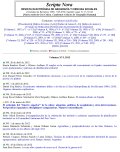“Adoção-pronta”: myths and constructions
Keywords:
Independent adoption, public policy, childhood and adolescence, social exclusionAbstract
This article, resulting from the author’s doctoral thesis, weaves considerations about the institution of adoption in the city of Rio de Janeiro, Brazil. It aims to analyze independent adoptions in light of the sócio-economic and political conditions of both families who give their children up for adoption and those who adopt children. We examine judicial dossiers dealing with placements in substitute families, filed in the 1st District of Juvenile Court in the City of Rio de Janeiro, during three historical periods: that of the first Code of Minors, that of the 1979 reformulated Code of Minors (that included the law of adoption) and the 1990 Statute of Children and Adolescents, which re-discussed and redefined the institution of adoption in Brazil. Our analysis –elaborated according to a theoretical perspective based on Foucault’s notion of genealogy, Guattari’s cartography, and discourse analysis– suggests that we should investigate the networks included in the processes of inclusion/social affiliation. It indicates that we must desconstruct myths and discourses that present poverty-stricken mothers as incompetent and thus naturalize their loss of parental authority. To summarize, our analysis poses the question, from the perspective of psychological networks of relationships, if we should not rethink the act of giving children into the care of others, as a resource for social inclusion, when including the participation of birthparents.Downloads
Published
2012-03-22
Issue
Section
Articles
License
Los autores que publican en esta revista están de acuerdo con los siguientes términos:
- Los autores conservan los derechos de autoría y otorgan a la revista el derecho de primera publicación, cin la obra disponible simultáneamente bajo una Licéncia de Atribución Compartir igual de Creative Commons que permite compartir la obra con terceros, siempre que estos reconozcan la autoría y la publicación inicial en esta revista.
- Los autores son libres de realizar acuerdos contractuales adicionales independientes para la distribución no exclusiva de la versió de la obra publicada en la revista (com por ejemplo la publicación en un repositorio institucional o en un libro), siempre que se reconozca la publicación inicial en esta revista.





